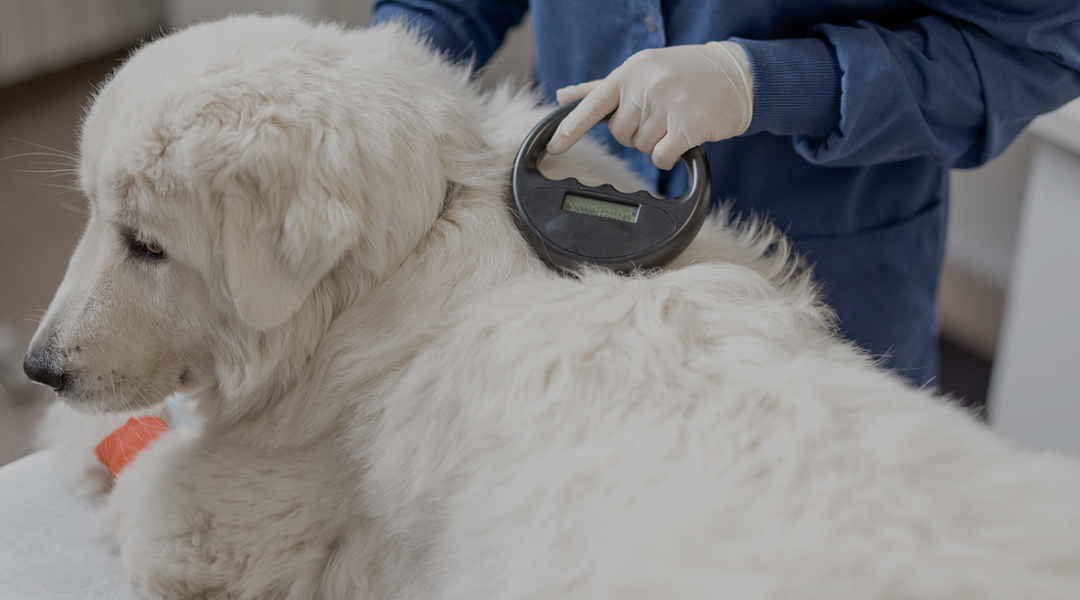Microchipping your pet

Everything you need to know about Microchipping
If you’ve recently taken in a new pet, whether you’ve rescued from a shelter or purchased through a breeder, the chances are they’ve been microchipped already by a local vet – and if they haven’t, you’ll probably need to look into sorting this. But whether that’s mandatory or not for your animal to be chipped depends entirely on what species they are – but first, let’s cover the basics.
What is a Microchip?
A microchip is a small device which is implanted by a vet in between your pet’s shoulders, under the skin, and measures in around 11-13mm – that’s roughly the size of a grain of rice.
The procedure is so quick and painless that your pet won’t feel a thing and is so small that they’ll never know it’s there.
A microchip’s purpose is to identify your pet when scanned using the link between the implanted chip, and the database your pet’s details remain on. Think of it a bit like a barcode or a QR code for your pet.
Therefore, this can be a quick and useful way of being reunited if your pet goes missing. How?
- When your lost pet is found, it can be taken to any local vet or animal charity where it will be scanned with a small device for a microchip
- If your pet is microchipped, the scanner will find the microchip number and identify your pet along with a home address and contact number, providing you’ve kept your details up to date of course.
- Once the vet identifies your pet, they can then contact you and reunite you with your best friend in no time.
My pet’s been Microchipped – what next?
As soon as your pet has been chipped, you’ll receive their chip number – this is a unique 15-digit number aligned with your pet and will identify them should they ever wander too far. Once you have the chip number, you can register this with your chip’s database – that’s where we come in!
With identibase, it’s completely free to register your pet and we offer three unique pet protection services to choose from to cover your pet should they ever be lost, missing or stolen.
identibase+
Secure & up to date details
- Link your details to your pet’s microchip
- Instant notification
when your missing
pet’s chip is scanned - 24/7 access to our
missing pet helpline - One plan covers all identibase chipped pets
£15 per year
identialert
Everything from identibase+
- Over 70% of missing pets with premium accounts made it home safely
- Instant alerts to local police, vets & wardens
- We’ll create posters
and contact pet keepers
in your area - Includes all the features of identibase+
£36 per year
£4.99 per month
(12 month contract)
identifind
Combine identialert with a PitPat GPS Tracker
Real time pet location tracking Award-winning activity monitoring to track exercise, distance & rest
£36 per year
+£129 one-off payment
Is it compulsory to microchip my pet?
This entirely depends on the species of your pet, so let’s break it down.
In 2016 it became a legal requirement for all dogs and puppies in the UK to be microchipped at no later than eight weeks old – and you can be fined up to £500 if your dog is found not to be microchipped. You can arrange for a vet to administer the chip, or charities such as Dog’s Trust, Blue Cross and Battersea will also be able to do this for free.
As of June 2024 it will be compulsory for all cats and kittens over 20 weeks old to be microchipped. Failure to microchip your cat could result in a £500 fine. You can arrange for a qualified professional such as a vet to implant the chip, or charities such as Blue Cross and Cat’s Protection will be able to do this for free.
In 2020 it became mandatory for all horses, ponies and donkeys in the UK to be microchipped – and you can be fined up to £200 if your animal is found without one. A vet can administer the chip and this will cost between £25 - £30.
Rabbits, Pets, Tortoises and other smaller animals can also be microchipped and although this isn’t required by law, it’s highly recommended and gives you the best possible chance of reuniting should they escape, go missing or be stolen.
Can I track my pet’s location if they’re microchipped?
Microchip technology is more than often confused with that of a GPS device, but a microchip’s sole purpose is to identify your pet when scanned, and contrary to popular belief, you cannot track your pet’s live location via a microchip – but that’s where our identifind service comes in! Learn more about the differences between microchips and GPS devices
Help Centre
Have a question or a little unsure what to do? Click on our Help Centre for support and guidance.